Last week, the United States celebrated a massive victory for LGBTQ people: a Supreme Court decision that determined LGBTQ people are protected under federal law against employment discrimination. Before the ruling, seventeen states had no laws against employment discrimination on the basis of gender identity or sexual orientation, and eleven states had laws that only partially protected some employees. The court’s decision marks such a sweeping victory that it rivals same-sex marriage legalization in the benefit it will have to LGBTQ people in the United States.
LGBTQ people have come a long way in the last hundred years. From underground communities to federal protections, our community has reaped the benefits of decades of protest, activism and advocacy at every level of society. We have a lot to be thankful for, and we’ve certainly earned our Pride celebrations.
But despite recent victories, this year’s Pride is different from most. Parades, parties and other celebrations across the country have been cancelled due to COVID-19 social distancing measures, and the streets are instead filled with Black Lives Matter protests. As a pandemic continues, unemployment is at a historic high, and an economic recession looms large in our future, this June calls us in for hard, but necessary, discussions about the state of our country.
In the United States, the LGBTQ experience today continues to be shaped by how far we have yet to go. LGBTQ people face broad economic disadvantages, unique challenges and continued discrimination.
LGBTQ people today experience ongoing economic hardship across the country. As many as 40 percent of homeless youth identify as LGBTQ. The unemployment rate among transgender individuals is three times higher than that of the general population. Disparities and inequalities in the general population also continue in LGBTQ communities. LGBTQ women on average earn less than LGBTQ men of the same sexual orientation, and LGBTQ people of each category earn less than their non-LGBTQ counterparts. Other groups experience further divides. Trans women’s wages fall by nearly a third after they transition.
Societal institutions still pose disproportionate threats to our community. LGBTQ people, and especially trans people, continue to experience discrimination and mistreatment in health care settings that prevents them from receiving adequate care. LGBTQ people are also 97 times more likely to report being sexually abused in immigration detention, and trans people report high rates of mistreatment in homeless shelters and of assault while incarcerated.
Where LGBTQ people do have protections, their unique needs often leave them out of existing benefits. For example, LGBTQ people’s community patterns mean forming close bonds with people not legally related to us — through estrangement from our own families, movement to urban areas, and bonding through shared experiences, LGBTQ people often form close chosen families not bound by legally recognized ties. 58 percent of LGBTQ people anticipate having to be a caregiver for a member of their chosen family in the event of an emergency. However, many paid leave benefits, including the Family and Medical Leave Act (FMLA), do not apply to chosen family members.
We also see that these hardships are disproportionately worse for people of color in the LGBTQ community. Trans people of color in particular are three times as likely as the general U.S. population to live in poverty. Black transgender people experience homelessness at more than five times the rate of the general public, and experience extreme poverty, unemployment, and HIV at high rates. LGBTQ people of color are also overrepresented in the prison system, and of the LGBTQ youth in juvenile justice facilities, 85 percent are people of color.
These statistics weigh heavy, but they are a call to action: we have to fundamentally shift how we view “LGBTQ issues.” There’s no better time to have that reckoning than this Pride. The loss of Tony McDade and the violence against Iyanna Dior, as well as the suffering of many others, reminds us that Black issues are LGBTQ issues, and LGBTQ issues are Black issues. The experiences of LGBTQ people every day remind us that gun violence and incarceration are LGBTQ issues, as are immigration, health equity and reproductive health care access. We have been fighting for decades to achieve true equality for ourselves and our chosen families. Our recent victories are just a reminder to keep going.


